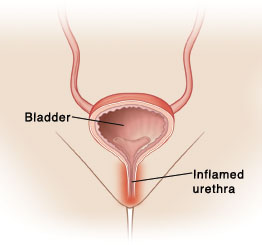We understand that gender is a spectrum. We may use gendered terms to talk about anatomy and health risk. Please use this sheet in a way that works best for you and your provider as you talk about your care.
Urethritis occurs when the urethra is red and swollen (inflamed). The urethra is the tube that passes urine from the bladder to outside the body. The urethra can get swollen and cause burning pain when you urinate. You may also have pain with sex. It can cause pain in the belly (abdomen) or pelvis. A urethral or vaginal discharge may also occur.
What causes urethritis?
Urethritis can be caused by a bacterial or viral infection. This kind of infection can lead to conditions such as a urinary tract infection (UTI) or sexually transmitted infection (STI).
Other infectious causes include viruses like herpes simplex virus, adenovirus, and fungal infections like candida.
Non-infectious causes of urethritis include injury or because of sensitivity or allergy to chemicals in lotions and other products. People who are postmenopausal are at risk for urethritis.
How is urethritis diagnosed?
Your health care provider will examine you and ask about your symptoms and health history. You may also have one or more of the following tests:
-
Urine and blood samples. These will be analyzed to help identify the organism that's causing the infection.
-
Vaginal culture. A sample of vaginal discharge is taken and tested for problems. A cotton swab is inserted into the vagina.
-
Cystoscopy. This test lets the provider look for problems in the urinary tract. The test uses a thin, flexible telescope called a cystoscope with a light and camera attached. The scope is put into the urethra.
-
Ultrasound. This lets the provider see a detailed image of the inside of your pelvis. Ultrasound will not show if you have urethritis. But it may show other signs of STIs that can also cause urethritis.
-
Nucleic acid test (NAT). This can tell if you have a virus or bacteria. It may be done instead of a culture because it allows for a faster diagnosis of chlamydia infection.
How is urethritis treated?
Treatment depends on the cause of urethritis. If it’s due to a bacterial infection, medicines that fight infection (antibiotics) will be given. Your provider can tell you more about your treatment options. In the meantime, your symptoms can be treated. To relieve pain and swelling, anti-inflammatory medicines, such as ibuprofen, may be given.
For sexually transmitted infections, all sexual partners get testing and treatment if necessary. This helps prevent the spread and reinfection of the STI.
If left untreated, symptoms may get worse. It can also cause scar tissue to form in the urethra, making it narrow. And it can lead to pelvic inflammatory disease.
When to contact your doctor
Contact your provider right away if:
-
You have a fever of
100.4 ° F (38.0 °C ) or higher, or as directed by your provider. -
You have burning pain with urination.
-
You have belly or pelvic pain.
-
You have increased urge to urinate.
-
You have discharge from the vagina.
Preventing STIs
When it comes to sex, it’s important to take care and be safe. Any sexual contact with the penis, vagina, anus, or mouth can spread an STI. The only sure way to prevent STIs is not to have sex (abstinence). But there are ways to make sex safer. Use a latex condom each time you have sex. And talk with your partner about STIs before you have sex.


